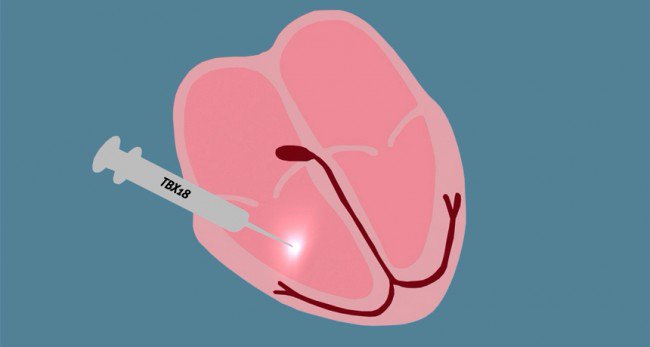
Nearly 300,000 U.S. citizens will have surgery to implant a mechanical pacemaker beneath the skin to alleviate a slow or irregular heart beats each year. A mechanical pacemaker, or pacer, is used when the built-in pacer is unable to regulate heart functions. Now, a research study on pigs at Cedars-Sinai Heart Institute in Los Angeles, California has revealed the possibility that the standard mechanical pacers could be replaced within the next decade by a cell hack to create a new bio-pacemaker.
Through a simple injection, a transcription factor called TBX-18 is delivered into the body, reprogramming some of the body’s own cardiac muscle cells to form a new bio-pacemaker. The potential bio-pacemaker could realistically make mechanical devices obsolete. However, the first trials on human patients is at least three years away.
In the first research study, the test subjects were pigs, and it only lasted for two weeks. Researchers artificially induced a complete heart block on 12 pigs and fitted the subjects with a back up mechanical pacer, in case the hack to create a bio-pacemaker failed to work as a viable replacement. The 12 pigs were then either injected with a protein solution or the TBX-18. Over the two-week study, the pigs that received the TBX-18 formed a new bio-pacemaker and did not need the backup device. Over the two-week study, the new bio-pacemaker kept the heart rate of the pigs remained steady. When the pigs became more physically active, the bio-pacemaker upped the heart rate correctly and within normal levels.
While the first test was a success, it was only two weeks long. The next step is for a six-week study. And that will be followed up with more studies until the researchers feel it is safe for human trials. Currently, the researchers are not sure how long the bio-pacemaker will last. The hope is, with further research, a single injection could potentially last the lifetime of the patient.
The research the study into bio-pacemaker was based on originated in 2006. Researchers created pluripotent stem cells by the introduction of four genes into fibroblast cells. This work earned the research the Nobel Prize in Physiology or Medicine in 2012. The researchers at Cedars-Sinai took that gene therapy study and took it to a level that could save numerous lives and cut out the need for surgery and repeated visits to monitor the health of a mechanical device.
By omitting the need for a mechanical device, patients at risk for surgery potentially could receive just an injection and live with normal heart functions. Newborn babies in need of a pacemaker could receive the shot soon after birth and live a long, and an active life without the need for a mechanical implant. There would no longer be a need to face servicing of the pacemaker that could require additional surgeries to replace malfunctioning devices or replace the battery after 10 years.
While human testing is years away, the potential that may render the need for a mechanical pacemaker unnecessary through an injection to hack the body’s cells, developing a new bio-pacemaker that could potentially last forever is exciting. Until then, doctor’s and heart patients will be anxiously awaiting the next round of testing on pigs by researchers in Los Angeles and hope for continued breakthroughs.
By Carl Auer
Sources:
Guardian Liberty Voice
Popular Mechanics
Forbes

